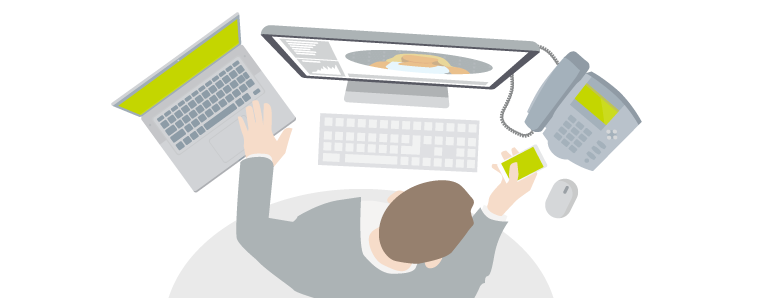While 80% of millennials sleep with their cellphones at night, the millennial workforce is woefully unprepared to place an outbound call. To be fair to millennials, it’s common among all generations to dislike and dread talking on the phone. So between a general social anxiety and the inexperienced millennials that make up half of the workforce, managers, business owners, and millennials need to proactively learn phone etiquette in the workplace.
This gap in professional phone etiquette is a pressing problem. As business expert Dana Manciagli explains in an interview, “The phone is trending up…[as] employers are relying on the phone more than ever” because it cuts down travel expenses, connects remote workers, maintains personal connections amidst the detached communications of emails, texts, and instant messaging, and continues to be the “weapon of choice when time is of the essence and the stakes are high.”
And here at Jive Communications, we witness the increasingly crucial role business phones play in the workplace—especially the advanced features available through VoIP technology.
How to make a professional outbound call
#1. Prep Before Dialing
To ameliorate the anxiety of making a phone call, drink the liquid courage of preparation. You will experience increased courage and peace of mind by knowing you’ve done everything you can to prepare. So before placing a phone call, have the phone number and contact name in front of you, all the documents, articles, websites, etc. you will refer to or discuss, and have a method for note taking.
#2. Hear the Smile
It’s so cliche that it pains me to write this suggestion, but my own personal experience, statistics, and psychological and physiological studies proves that smiling while talking on the phone is key.
#3. Create an Entrance & Exit Strategy
The beginning and ending are stress points in any phone call. Luckily, there are simple scripts that you can learn and memorize.
Play some mad libs with these scripts to see what suits your style and situation:
Appropriate Greetings: Hi. Hello. Hey. Good Morning. Good Afternoon.
[Greeting] this is [name] with [company], may I speak to [person’s name]
Hello! This is Ben Jonson with Jive Communications, may I speak to Mary Sydney?
[Greeting] this is [name] with [company], is this [person’s name]?
Good morning! This is Joe with Jive. Is this Mary?
[Greeting] this is [name]. May I speak to someone in [department]?
Hi! This is Ben with Jive. May I speak to someone in the pricing department?
Appropriate Farewells: Bye. Have a nice day. Have a great weekend. Talk to you soon.
Thank you, [person’s name]! Have a great weekend.
Thank you, Mary! Have a great weekend.
So I think we’ve covered everything. Thank you, [person’s name]! Talk to you soon.
So I think we’ve covered everything. Thank you, Mary! Talk to you soon.
[Summarize conversation]. Thank you, [person’s name]! Have a great day.
So I will email you the list of candidates for the job interview. Thank you, Mary! Have a great day.
#4. Perfect Your Phone Technique
The technique for holding a phone is simple, but it’s one of the most common mistakes. To avoid muffles and inaudibility, hold the phone 2 fingers from your mouth.
#5. Narrate Away Awkward Silences
Forbes recently recognized Jive Communications for our excellent customer service. Jive retains 98% of our customers—we’re that good. So we asked our customer service managers for a tip on making professional phone calls, and our managers stressed the importance of being responsive and giving verbal feedback.
Communicate that you are listening with phrases like “All right,” “I see,” and “okay.”
Avoid awkward silences by narrating important actions. Communicate that you are opening up an email, putting them on speakerphone, looking for a document, waiting for your computer to load, searching for a pen, writing down notes, etc.
Use your office phone like a professional
Be confident using your office phone! If you’re a millennial unfamiliar with making calls or an employee with phone anxieties, just look over these five steps before you dial. Practice. Practice is important. Soon professional phone etiquette will be second nature when you pick up your office phone

